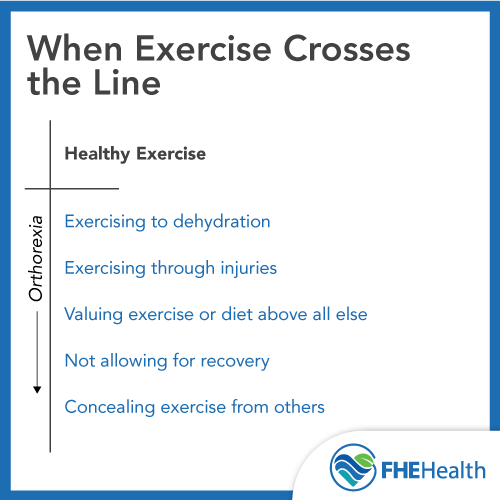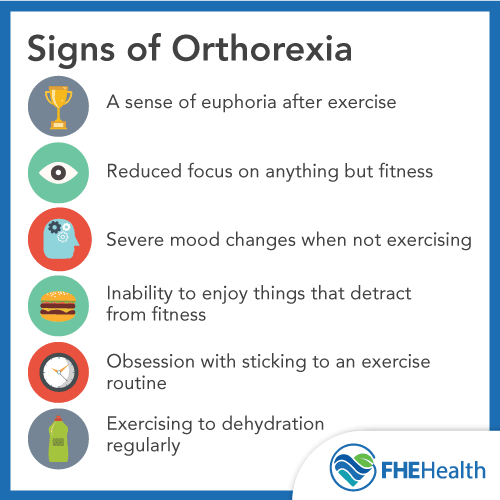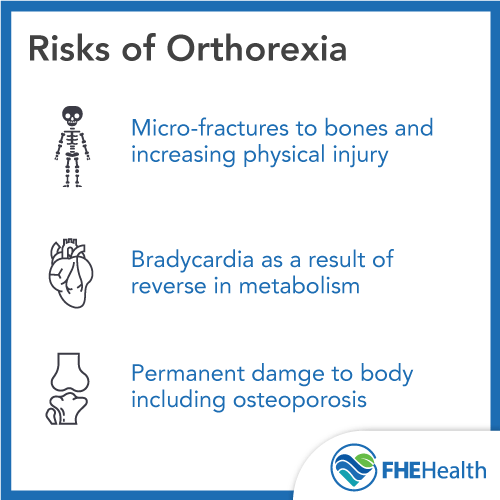
Many men and women want to look fit, but an unhealthy obsession with fitness can be an exercise addiction. Those who exhibit this condition spend a significant amount of time focused on body image, exercise methods, and overall physical fitness. This is a type of mental health disorder much like an eating disorder or body image disorder.
What Is Exercise Addiction and Orthorexia?
Orthorexia is a form of addiction centered on healthy eating, an obsession over eating clean foods. Many people with it also have an exercise addiction, a condition in which a person engages in compulsive exercise. Both conditions focus on a person’s perception of their body.
Doctors first described compulsive exercise in the 1970s, according to a study published in the U.S. National Library of Medicine. Researchers define it as an uncontrollable level of excessive exercise behavior that creates a harmful outcome. It can interfere with social relationships or create a risk for health complications.
According to the study, this form of addiction has components of neuroticism, perfectionism, obsessive-compulsive traits and narcissism. Yet the consequences of this form of addiction affect not just the people around the patient but can lead the patient to develop depression, social relationship difficulties and, in some cases, substance abuse.
How Do You Draw the Line Between Orthorexia and Healthy Fitness?

It can be hard to see the difference between what’s healthy and what’s not. Orthorexia occurs when a person is putting himself in some form of danger and forgoing relationships or responsibilities as a result of their need to “eat clean” or exercise. Common characteristics of going too far include:
- Going to great lengths to continue the habit, even leading to dehydration
- Seeing injuries such as back or knee pain as unimportant and continuing on without resting
- Getting in a workout or finding the ideal meal are more important than any expense or loss
- Not taking days off from exercise for recovery
- Typically exercising in unsafe conditions or secret areas because they realize they’re overdoing it
Perhaps most importantly and hardest to pinpoint is the link to self-image. A person with these conditions bases their self-worth on their physical appearance.
Who Is Most Likely to Suffer from Fitness Addiction?
Any type of fitness addiction can occur to any person in any demographic. However, it’s most likely to occur in those who have a predisposition for mental health disorders and low self-worth. Those who have other types of eating disorders, including anorexia, may be more likely to suffer from orthorexia or fitness disorders.
A study published by the National Institutes of Health found 44 percent of adolescent girls and 38 percent of adolescent boys suffered from compulsive exercise disorder. While this condition can occur to anyone, teens and young adults are highly acceptable to it.
What Are the Signs of Orthorexia?
 The symptoms of any type of exercise addiction or orthorexia center on behaviors. These include:
The symptoms of any type of exercise addiction or orthorexia center on behaviors. These include:
- A sense of euphoria after exercise
- Reduced focus on responsibilities outside of fitness and health
- An uncontrollable desire to exercise; thinking about exercise constantly
- Feeling symptoms of withdrawal when not exercising, including mood changes
- Inability to stick to an exercise routine that’s less than normal
Those with healthy eating disorders also are likely to not eat food, even when they physically need to, if they think it’s unhealthy in some way. This is common in those with a fitness addiction.
How Addictive Is Exercise Compared to Other Disorders?
Exercise can be very addictive, especially for those who have previously exhibited risk factors such as other addictions or eating disorders. Those who have this type of addiction display many of the same characteristics as people with other forms of addiction, such as:
- Engaging in behavior in secret (though they may also exercise in groups)
- Obsessing over behaviors
- Recognizing they are overdoing it and wanting to stop but being unable to do so
- Understanding their behavior is risky and can cause physical harm but still engaging in it
While it isn’t fair to compare exercise addiction to chemical dependency, it is quite the same as other forms of mental health disorders and behavioral disorders.
Risks Associated with Orthorexia
 Exercise compulsion like this can have numerous risk factors, especially when it occurs over a long period of time. These include:
Exercise compulsion like this can have numerous risk factors, especially when it occurs over a long period of time. These include:
- Development of physical injury with prolonged limitations, such as micro-fractures to the bones
- Bradycardia, a type of low heart rate that occurs as a result of a reverse in metabolism
- Damage to the body, including conditions such as osteopenia and osteoporosis from rapid weight loss
The disorder has a psychological impact as well. Those who obsess over their physical appearance are more likely to develop conditions such as substance abuse or mental health disorders such as anxiety and depression. In some cases, those focused on exercise may opt to take supplements or use drugs to help them lose weight or improve the outcome of a routine. This can lead to addictive behaviors with those substances as well.
Treatment Options Available for Orthorexia
Treatment for exercise compulsion and orthorexia centers on reversing the psychological dependency the condition forms. A key component is the use of cognitive behavioral therapy, in which a person learns to recognize their behaviors and how to take steps to avoid them. Counseling and one-on-one support from therapists can also help.
Many patients do well with complementary services as well, such as the use of yoga or meditation. Some are in need of medical care for injuries or malnutrition or require more intense mental health disorder treatment. Those who have self-image disorders can find treatment to help them to gain confidence and a level of control over their body.
Seeking Care for Addiction
Any form of addiction changes lives. At FHE Health, we work closely with patients experiencing all types of addiction, including exercise addiction, through comprehensive mental health treatment. Contact us to learn more about the services available to you by calling (833) 596-3502.






